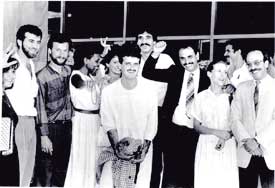Victory at last for Los Angeles 8
By
John Catalinotto
Published Feb 1, 2007 12:53 AM
Justice delayed may be justice denied, and in the 20-year-old case of the Los
Angeles 8 it was denied with a vengeance. But a strongly worded Jan. 30
decision by Judge Bruce Einhorn to dismiss charges against the remaining two
defendants was still a victory.
|
The Los Angeles 8 and supporters in 1987.
Photo: www.committee4justice.com
|
The immigration court in Los Angeles “finds that the government has
failed to carry its burden of proving respondents deportable based on clear,
unequivocal and convincing evidence. Therefore, the proceedings against
[Khader] Hamide and [Michel] Shehadeh are terminated.”
Judge Einhorn wrote in the decision that “the attenuation of these
proceedings is a festering wound on the body of these respondents, and an
embarrassment to the rule of law.”
A release from the LA 8 said, “This is a clear recognition by the court
of the suffering of the respondents and their families unjustly for more than
20 years. Moreover, it is recognition that the government has nothing against
the respondents except that it does not like their political views.”
“On behalf of the LA 8 and their families, a big thank you and gratitude
to each and everyone who helped us in any way to make this win possible,”
said Michel Shehadeh.
The LA 8 first consisted of seven Palestinian men and one Kenyan woman. In
1987, armed FBI agents raided their southern California homes in the middle of
the night and arrested them. The arrests culminated a long witch-hunt-type
investigation.
Initially, the charges against them were based exclusively on the
McCarran-Walter Act of the Red-scare era: that the eight supported the Popular
Front for the Liberation of Palestine, and had raised funds and passed out
literature that aided that Marxist group.
Decisions in the case have already had a significant legal impact, both
progressive and regressive. Based on the case, in 1988 a federal district judge
made a progressive ruling that the McCarran-Walter Act was unconstitutional
because it denied immigrants their First Amendment rights.
On the reactionary side, a Supreme Court opinion that came about as a result of
this case stated, “An alien unlawfully in this country has no
constitutional right to assert selective enforcement as a defense against his
deportation.” This was exactly what the lawyers for the LA 8 had
argued.
In 1987, no one—citizen or not—could be prosecuted for association
with an organization, regardless of the group’s relationship with the
U.S. government. Yet the case proceeded—first based on the PFLP’s
Marxist character, then on the FBI’s assertion that the PFLP intends
“destruction of property,” and, still later, on the
government’s accusation that the PFLP intends to do violence and
assassinate leaders of states.
While the LA 8’s supporters consider this latest decision a victory, they
warn, “It is not over yet. The government most likely will appeal the
decision; there is no indication that they will let this go despite all the
legal and political embarrassment. Therefore, we have to stay alert and ready
to move forward in supporting this important case whenever and for whatever
needed to end this injustice.”
Articles copyright 1995-2012 Workers World.
Verbatim copying and distribution of this entire article is permitted in any medium without royalty provided this notice is preserved.
Workers World, 55 W. 17 St., NY, NY 10011
Email:
ww@workers.org
Subscribe
wwnews-subscribe@workersworld.net
Support independent news
DONATE


